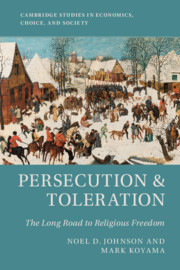Book contents
- Frontmatter
- Contents
- List of Figures
- List of Tables
- Preface
- Acknowledgments
- 1 Toleration, Persecution, and State Capacity
- I Conditional Toleration
- II The Origins Of Religious Freedom
- III Implications Of Greater Religious Liberty
- 11 The Persecution of Witchcraft
- 12 Religious Minorities and Economic Growth
- 13 The Emergence of Modern States, Religious Freedom, and Modern Economic Growth
- 14 Applying Our Argument to the Rest of theWorld
- 15 Modern States, Liberalism, and Religious Freedom
- 16 Conclusions
- Bibliography
- Index
16 - Conclusions
from III - Implications Of Greater Religious Liberty
Published online by Cambridge University Press: 18 February 2019
- Frontmatter
- Contents
- List of Figures
- List of Tables
- Preface
- Acknowledgments
- 1 Toleration, Persecution, and State Capacity
- I Conditional Toleration
- II The Origins Of Religious Freedom
- III Implications Of Greater Religious Liberty
- 11 The Persecution of Witchcraft
- 12 Religious Minorities and Economic Growth
- 13 The Emergence of Modern States, Religious Freedom, and Modern Economic Growth
- 14 Applying Our Argument to the Rest of theWorld
- 15 Modern States, Liberalism, and Religious Freedom
- 16 Conclusions
- Bibliography
- Index
Summary
The best things on religious liberty were said in the sixteenth century but not practiced until the nineteenth.
Roland H. Bainton (1951, 253)Religious beliefs and practices emerged as a consequence of the deep-seated desire for meaning that characterizes humanity. For anthropologists, the desire to seek meaning in the world distinguishes Homo sapiens from earlier hominids. The quest for meaning led to the creation of myths and cultural beliefs and that, in turn, enabled human communities to band together into groups larger than extended kinship networks.
As religion is coeval with large-scale society, it is unsurprising that the relationship between religion and political authority that arose in early agricultural societies was close. Religion was not a separate sphere from politics. The two were intricately related in every aspect of life as religion was a source of group identity and shared social meaning.
Early human societies existed on the edge of subsistence. They could be threatened by natural disasters, climate change, or invasion by a neighboring group. Given the dangers they faced, and given their beliefs, it is natural that they enforced religious worship because impiety could endanger the entire community. There was no notion of religious freedom.
Over time, agrarian civilizations became more complex. Empires rose and fell. As more sophisticated forms of governance arose, the close relationship between religion and politics strengthened. The most successful religions encouraged pro-social behavior. During the Axial Age (c. 700–200 BCE), Judaism, Buddhism, and later, Christianity developed, each responding to the concerns of ordinary people in highly unequal agrarian societies. These religions were initially radical and destabilizing, but they were soon accommodated into the preexisting political equilibrium, an equilibrium based on a partnership between religion and the state.
This book has examined how this equilibrium first broke down in Western Europe. It has studied the transformation from a world where religion and politics were inseparable to a world where both religious and broader social and intellectual freedoms became both worthy of respect and deserving of protection. Our argument does not imply that modern liberal societies have attained full religious liberty. Today,modern liberal states are committed to the ideal of religious freedom, but this commitment is often observed in the breach. Tensions and unresolved problems remain, and new issues will always arise.
Information
- Type
- Chapter
- Information
- Persecution and TolerationThe Long Road to Religious Freedom, pp. 293 - 311Publisher: Cambridge University PressPrint publication year: 2019
